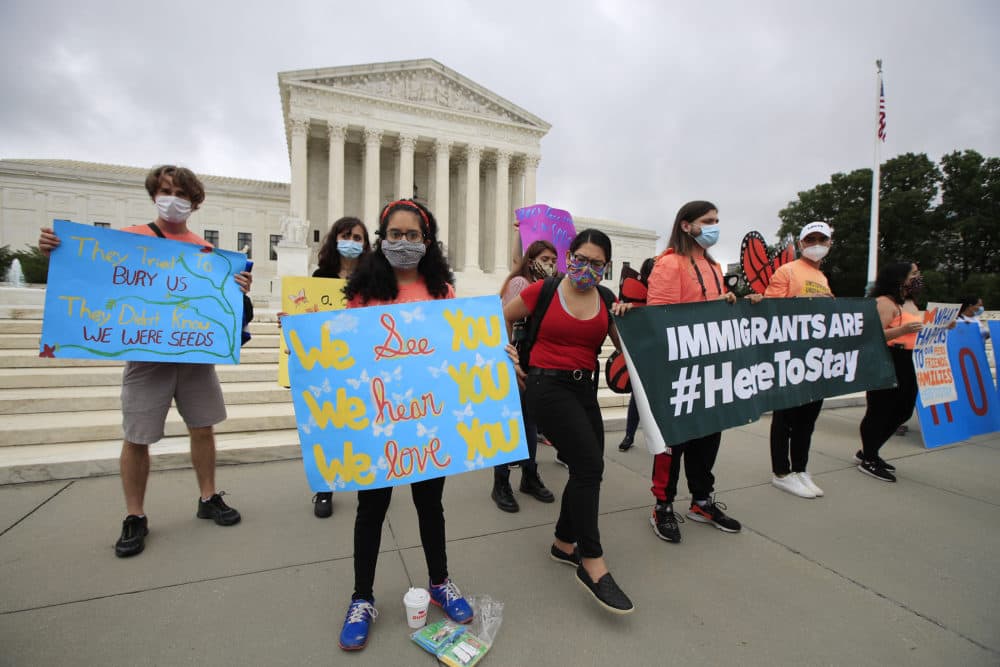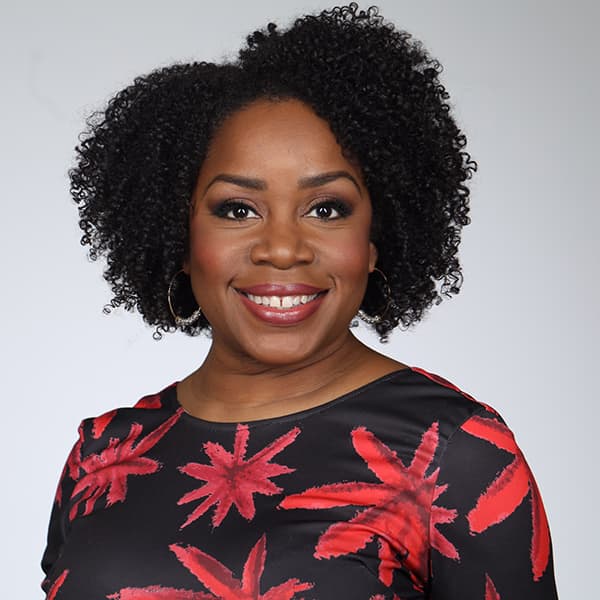Advertisement
DACA Recipients, Advocates And Mass. Politicos Rejoice Over SCOTUS Ruling
Resume
For nearly 6,000 active DACA recipients in Massachusetts, the decision Thursday from the U.S. Supreme Court upholding the Deferred Action for Childhood Arrivals program means they can continue working and going to school — all without fear of deportation.
The fate of this temporary immigration protection for some people brought illegally into the United States as children has been in question for three years. Across the state and the country, young people known as “DREAMers” were glued to their computers and phones Thursday morning, waiting to hear the news.
Twenty-two-year-old Estefany Pineda, a rising senior at the University of Massachusetts, Boston, nervously refreshed the Supreme Court's website, waiting for the opinion to appear.
“I came to the United States when I was 9 years old,” she explained. “I was able to get DACA in 2016, so I’ve had it ever since and then just waiting to see what happens today.”
Pineda spoke with WBUR three years ago, on her first day of college classes. It was the same day then-Attorney General Jeff Sessions announced the Trump administration was rescinding the Deferred Action for Childhood Arrivals program.
Ever since then, Pineda and her two sisters — all three DACA recipients — have been in limbo while legal challenges played out. On Thursday morning, she sat in front of her computer, refreshing the Supreme Court’s website, waiting for the opinion to appear.
“So is it in favor of us? It’s in favor of us? Yay!” she said, clapping her hands and starting to cry. “Oh my goodness, I don’t know what comes next.”
Pineda, originally from El Salvador, told her mom in Spanish the court ruled 5-4 in the favor of DREAMers. After taking a few deep breaths, she said the court’s decision means she can pursue her master’s degree at UMass, and keep working to help support her family.
Higher Education Institutions React
In the eight years since its creation, DACA has opened up the world of American higher education to undocumented young people.
Before DACA was introduced in 2012, even those who did attend college did so “without a clear picture of their future,” said Roberto Gonzales, a sociologist at the Harvard Graduate School of Education. That was owing to restrictions on many kinds of work and feeling the threat of deportation was often close at hand.
In hundreds of interviews with DACA recipients beginning in 2013, Gonzales and other researchers found that 70% reported a decline in overall stress. Three-quarters of those who sought a professional certificate or license — a common educational option in the cohort due to its affordability and flexibility — had more than doubled their income.
Gonzales said that it was no accident that colleges like the University of California — as well as local schools like Tufts and Harvard — came to advocate for DACA recipients.
It’s not only that they represented prospective students; even under DACA, undocumented students can’t receive federal financial aid. Rather, Gonzales said, “Colleges and universities were [among] the first institutions that undocumented young people targeted in their activism.”
“The thought was that if they could get powerful university presidents to listen to them, and to side with them,” the resulting influence could stretch to Washington, he said.
As chancellor of UMass Boston for the past two years, Katherine Newman came to know a number of DACA recipients enrolled there as students. She described them as "salt-of-the-earth—the hardest working, most dedicated... They'll become the leading lights of their generation."
Newman said that students and administrators at New England's most diverse public university celebrated today, albeit remotely. But she also said they still feel vulnerable, given the narrow and procedural nature of the ruling.
"It's not a decision on the fundamental fairness and wisdom of DACA," Newman said. "What we really need is for this to be decided once and for all, and our DACA students legalized completely and without question."
In a message sent to the Harvard community, Lawrence Bacow — the university’s president — sounded a similar note, calling Tuesday’s ruling “a welcome, albeit temporary, reprieve from uncertainty” for DREAMers.
Bacow also called on Congress to “turn its attention to immigration reform and provide a pathway to citizenship for these young people and others, including individuals with temporary protected status.”
Mass. Politicos Want To Codify DACA Into Law
The ruling holding that Homeland Security officials violated federal law in the procedure it used to rescind DACA is only a technical setback for the Trump administration.
The Supreme Court left open the ability for the administration to rescind the order again, if it does so in a way that adheres to the process set out in the Administrative Procedure Act.
In an election year, the ruling thrusts into the spotlight the hot-button issue of immigration reform — an issue both President Trump and Democratic challenger Joe Biden have seized on.
Members of the Massachusetts delegation called the ruling a victory, but said more must be done. Sen. Elizabeth Warren called on Senate Majority Leader Mitch McConnell to hold a vote on House-passed legislation that would codify the DACA order into federal law.
“I’m happy the Supreme Court upheld DACA to protect Dreamers from the crisis Trump created,” Warren tweeted. “But we can’t stop here. The House passed the American Dream & Promise Act over a year ago.”
Sen. Ed Markey said he is “thrilled and relieved for our DREAMers that the Supreme Court upheld DACA.”
“They belong here, at home,” Markey said in a statement. “Today, we celebrate a victory for justice. But the fight will go on, and we won’t stop until these young people are permanently protected.”
Rep. Seth Moulton called the ruling a “long-overdue” result that is “not only about federal law, but also our constitutional values.”
“DREAMers are American in every way except on paper,” Moulton told WBUR. “They go to our schools. They work in our businesses. They fight and die in our nation’s military. They’re willing to put their lives on the line for our values.”
Rep. Richard Neal said the ruling gives Democrats motivation to vote against Trump in November.
“In 4.5 months the American people have a chance to defeat him and his bigoted policies at the ballot box,” Keating said in a statement. “I've never looked more forward to a vote in my life.”
Immigration advocates shared a similar sentiment expressed by the Massachusetts Congressional delegation.
“This is a huge victory — not just for the DACA recipient, but this is also a victory for immigrants more broadly,” said Eva Millona, who heads up the Massachusetts Immigrant and Refugee Advocacy Coalition.
Millona said now is the time to celebrate the Supreme Court’s ruling.
“The Trump administration has tried to assert near absolute power over immigration, and today the Supreme Court made it clear that even if the president can legally terminate DACA, he must do it for legitimate reasons,” she said.
However, Millona cautioned this decision shouldn’t be considered the ultimate victory, saying the only permanent solution is for Congress to pass legislation protecting DREAMers.
This article was originally published on June 18, 2020.


